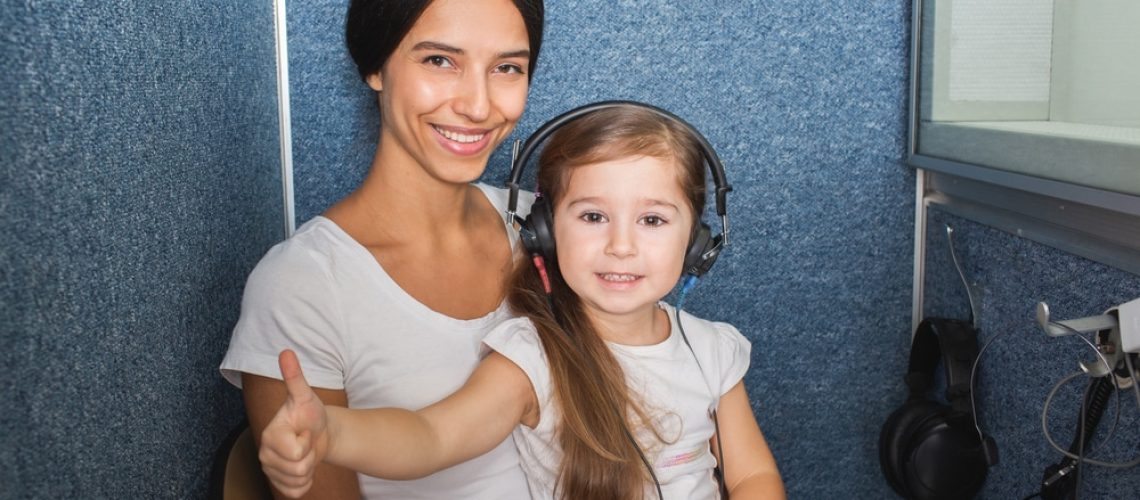If your child undergoes hearing tests at school or through their pediatrician, it can be easy to think your child doesn’t need to see an audiologist. Although for many people this is true, hearing problems during early life can have compounding effects. It’s important to catch hearing problems as soon as possible. A comprehensive hearing test can have a tremendous, positive impact on setting your child up for success. Whether you’ve never considered taking your child to an audiologist or are wondering what to expect from an appointment, here’s what to know about why it’s important and how our Doctors of Audiology take a unique approach to your child’s hearing health.
Why are hearing tests important?
The American Academy of Pediatrics recommends that all newborns have a hearing screening within one month of life – ideally before they leave the hospital. That’s because hearing problems are one of the most common birth defects. In fact, about 1 to 3 in every 1,000 babies have hearing function outside the ideal range. Additionally, about 1 to 2 in every 100 babies will not pass the initial hearing screening performed within one month of life. If so, it’s extremely important to intervene as soon as possible.
The primary way that children learn and develop is through listening – to the sounds around them and to the conversations they have in daily life. When your child has trouble hearing, it can drastically delay their language development and ability to socialize, especially in academic settings. In fact, hearing difficulties can put your child behind their peers by whole grade levels, which can compound if your child is unable to keep up with new concepts that build on old ones. Finally, it can be extremely difficult for children to communicate what they’re experiencing, meaning it may not always be obvious.
What tests will my child have at Hearing Doctors of New Jersey?
At Hearing Doctors of New Jersey, we utilize some of the most comprehensive and effective methodologies for understanding your child’s hearing and getting treatment. Although we’ll perform comprehensive, in-office tests to determine your child’s hearing capability, we believe that involving you and your child’s support network can help us get a more complete picture of what your child needs to succeed. Here’s what you can expect from our pediatric team.
Early Listening Function (ELF)
ELF, or early listening function, is an instrument designed to include parental involvement in the child’s hearing diagnosis. In many cases, it can help present an alternative set of data gathered in a more natural and normalized environment for your Doctor of Audiology to pair with in-office tests. You’ll be given some detailed instructions to follow, including 12 listening activities to be performed in quiet, typical, and loud environments. You’ll perform certain sounds and observe your child’s response at different distances to get a better picture of your child’s “listening bubble” so we can determine their hearing range.
Children’s Home Inventory for Listening Difficulties (CHILD)
CHILD is another assessment performed at home and in different everyday situations. You’ll report on each situation with a ranking based on how well your child hears and understands in noisy or quiet environments like a restaurant, social situation, playroom, or car ride. This includes conversing with them, calling their name from a different room, or observing them with their peers, for example. This can help your audiologist gauge their hearing ability in normal situations by observing behavioral cues that may not otherwise present in an office testing environment.
Screening Instrument for Targeting Educational Risk (SIFTER)
SIFTER is an assessment performed by your child’s teachers to gather data about your child’s interactions and success at school. It can be performed at the preschool level and beyond, based on your child’s needs. Your child’s teacher will rank your child’s behavior in areas like academics, attention, communication, class participation, and school behavior in order to determine whether your child is experiencing difficulties in academic settings. Often, these areas can begin to suffer if your child has undiagnosed hearing loss, which can put their educational success at risk going forward.
The ELF, CHILD, and SIFTER tests are available to download in our patient forms.
Schedule an Appointment
The best time to get your child help for hearing loss is right away. During an appointment with our team, we can create a customized treatment plan for your child and help you understand what to expect. Schedule your appointment at our Livingston office by clicking here or calling now.

